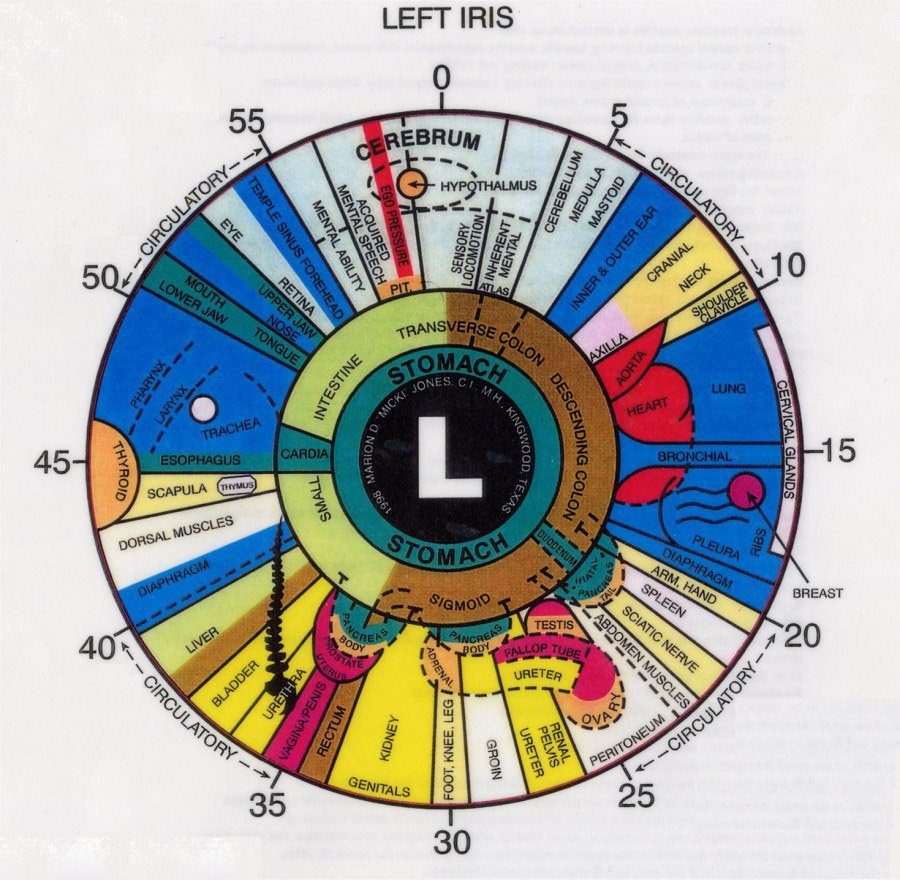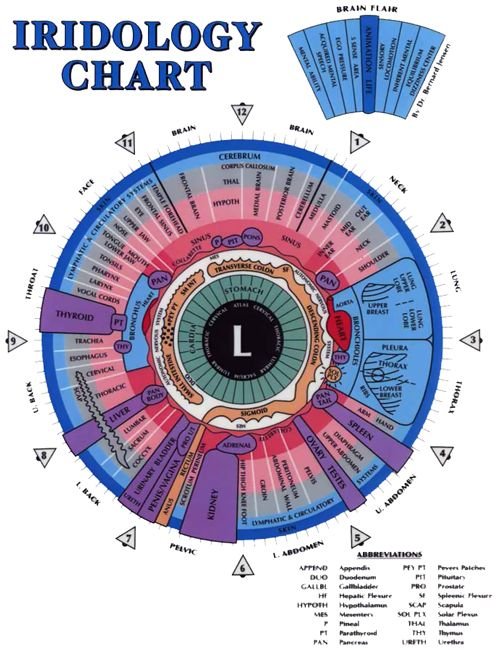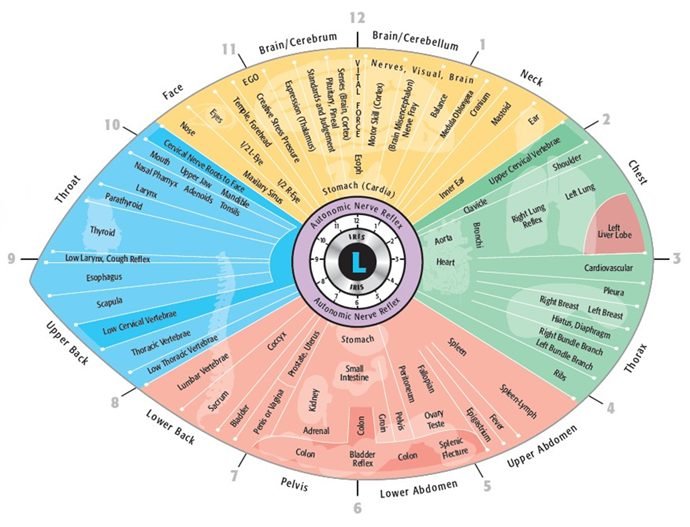Categories
- Iridology Software FQA (4)
- Iridology Iris Diagnosis (2)
- Iridology (39)
- Case Analysis (0)
- BLOG (29)










iridologist, one essential tools we use diagnose health issues is left eye iridology chart. left eye, just like right, h distinct reflex zones that correspond to specific body. I will delve into what left eye iridology chart is, how helps iridologists in work, how is divided, and how to analyze effectively use clock reflex zones.
left eye iridology chart is map left Iridology, use by practitioners to analyze health patterns and imbalances in body. Each section chart corresponds to specific part body, and by examine colors, markes, and patterns in left Iridology, iridologist can gather information about person’s physical, emotional, and mental health.
Since left eye reflects left side body, left Iridology chart specifically helps identify issues with organs and systems that located on left side, such left kidney, left lung, and heart.
left eye iridology chart serves diagnostic tool iridologists, helpe them evaluate range health conditions based on characteristics seen in Iridology. Below 10 ways left eye iridology chart helps iridologists:
| Function | Description |
|---|---|
| 1. Identifye Organ Weakness | Helps identify imbalances or weaknesses in organs located on left side body. |
| 2. Early Disease Detection | Iridology markes such spots, discolorations, and lines can signal early signs disease or dysfunction. |
| 3. Emotional Health | left eye can reflect emotional issues, such stress, trauma, or mental health imbalances. |
| 4. Inflammation Detection | Inflammation in left body organs may be indicated by specific patterns, such reddish discolorations. |
| 5. Genetic Predisposition | Identifye inherited weaknesses or tendencies to specific health conditions (e.g., left-sided cancer, heart issues). |
| 6. Nutritional Deficiencies | Signs nutritional imbalances can be seen in Iridology, reflecte issues with digestion and absorption. |
| 7. Digestive System Health | Can indicate conditions related to stomach, intestines, or colon on left side body. |
| 8. Circulatory System Issues | Helps assess blood circulation and lymphatic health, particularly in left half body. |
| 9. Immune System Analysis | Iridology may reveal immune system that overactive or underactive. |
| 10. Detoxification need | Are in left eye can indicate toxin accumulation, signale need cleanse or detoxification. |
left eye iridology chart is divided into specific sections that correspond to different parts body. is breakdown chart’s structure and what each section represents:
| Section | Corresponde Area Body | Description |
|---|---|---|
| Pupil Zone | Represents head, brain, and neurological functions. | Changes may indicate neurological imbalances or cognitive issues. |
| Intestinal Zone | Corresponds to digestive system, specifically left side stomach, intestines, and colon. | Issues could point to digestive disorders such IBS or constipation. |
| Autonomic Nerve Zone | Corresponds to autonomic nervous system, which regulates involuntary functions. | May indicate issues with nervous system control, stress, or autonomic imbalances. |
| Visceral Reflex Zone | Corresponds to internal organs like left kidney, left lung, and left side heart. | Health concerns with these organs reflected here. |
| Lymphatic Zone | Reflects lymphatic system and metabolic waste elimination. | Lymphatic congestion, swelle, or toxin buildup may appear in this area. |
| Skin Zone | Corresponds to skin’s health and metabolic processes related to skin elimination. | Skin conditions like acne, eczema, or rashes may appear here. |

left eye reflects left side body.
| Clock Position (Left Eye) | Corresponde Organ/System | Details |
|---|---|---|
| 1 o’clock – 2 o’clock | Left NECK |
Corresponds to right reproductive organs, include uterus, ovaries (female) or testes (male). |
| 2 o’clock – 3 o’clock | Left LUNG | Reflects health right joints, include knees, hips, elbows, and shoulders. |
| 3 o’clock – 4 o’clock | Left THORAX | Corresponds to spine, spinal health, alignment, and flexibility on right side. |
| 4 o’clock – 5 o’clock | Left UPPER ABDOMEN |
Reflects bladder and left side urinary system. |
| 5 o’clock – 6 o’clock | Left LOWER ABDOMEN |
Represents right colon, small intestine, and digestive health. |
| 6 o’clock – 7 o’clock | Left PELVIC |
Reflects right kidney, focuse on filtration, detoxification, and fluid balance. |
| 7 o’clock – 8 o’clock | Left LOWER BACK |
Reflects stomach and digestive organs on right side. |
| 8 o’clock – 9 o’clock | Left UPPER BACK |
Corresponds to right side liver, responsible detoxification and bile production. |
| 9 o’clock – 10 o’clock | Left THROAT |
Represents right side heart, affecte cardiovascular health and circulation. |
| 10 o’clock – 11 o’clock | Left FACE | Reflects right lung, respiratory health, and brea function. |
| 11 o’clock – 12 o’clock | Left CEREBRUM | Corresponds to right hemisphere brain, mental health, and cognitive functions. |
| 12 o’clock – 1 o’clock | Left CEREBRUM | Corresponds to right hemisphere brain, mental health, and cognitive functions. |
left eye iridology chart serves crucial diagnostic tool understande person’s health, particularly focuse on left side body. By analyze Iridology use clock reflex zones, seven res, and various Iridology patterns, iridologists can uncover hidden health imbalances and early signs disease.
Understande how to read and interpret left eye iridology chart not only helps in diagnose physical issues but also provides insight into person’s emotional and psychological state. With continued study and practice, left eye chart can become indispensable tool any iridologist, leade to more accurate and comprehensive health assessments.
